Tags:
rehabilitation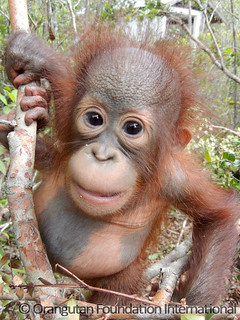 Since its establishment in 1971, Orangutan Foundation International (then termed Orangutan Research and Conservation Program) has cared for vulnerable orphaned orangutans who have been brutally separated from their mothers, along with older injured and displaced orangutans. Without a doubt, the most helpless orangutans at the Orangutan Care Centre and Quarantine (OCCQ) are the newly arrived infant orphans. These tiny babies are often malnourished and sick and suffering from the trauma of losing their mothers. The love and care of a mother can never be replaced but OFI caregivers provide as much support as they can as surrogate mothers to the orangutan orphans.
Since its establishment in 1971, Orangutan Foundation International (then termed Orangutan Research and Conservation Program) has cared for vulnerable orphaned orangutans who have been brutally separated from their mothers, along with older injured and displaced orangutans. Without a doubt, the most helpless orangutans at the Orangutan Care Centre and Quarantine (OCCQ) are the newly arrived infant orphans. These tiny babies are often malnourished and sick and suffering from the trauma of losing their mothers. The love and care of a mother can never be replaced but OFI caregivers provide as much support as they can as surrogate mothers to the orangutan orphans.
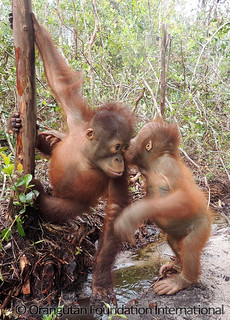 These infants require the most extensive and specialized care that OFI can provide. With the generous support of donors, OFI was recently able to open a brand new infant care facility just for these tiny orangutans. At the new facility – named Pondok Danielle – the infants are able to adjust to their new surroundings in a secluded area of the OCCQ.
These infants require the most extensive and specialized care that OFI can provide. With the generous support of donors, OFI was recently able to open a brand new infant care facility just for these tiny orangutans. At the new facility – named Pondok Danielle – the infants are able to adjust to their new surroundings in a secluded area of the OCCQ.
Pondok Danielle is tucked away in a corner of the OFI nursery forest away from the hustle and bustle. Here the infant orangutans can have tranquility and quiet with only the sounds of the forest around them. Each orangutan is cared for in a tailor-made way, which includes the food each receives and the different kind of medical care each needs. With a dedicated team of caregivers working day and night shifts, the infant orangutans receive care around the clock. 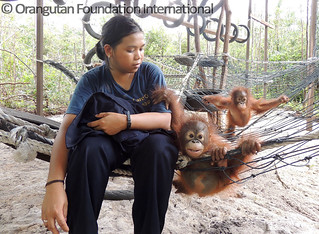 For those infants who are too young to sleep alone at night, a staff member will sleep with them to provide the reassurance they need. The caregivers genuinely love their work and become very attached to the orphans. They will refer to the orangutan infants they help raise as their own children and are proud when they are finally released back into the wild. The love and care provided by the caregivers is reflected in the infants’ trust that they develop in their caregivers. Watching these orphaned orangutans look up to their caregivers with love reflected on their faces provides special moments and memories.
For those infants who are too young to sleep alone at night, a staff member will sleep with them to provide the reassurance they need. The caregivers genuinely love their work and become very attached to the orphans. They will refer to the orangutan infants they help raise as their own children and are proud when they are finally released back into the wild. The love and care provided by the caregivers is reflected in the infants’ trust that they develop in their caregivers. Watching these orphaned orangutans look up to their caregivers with love reflected on their faces provides special moments and memories.
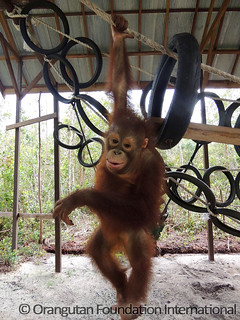 Each day there is boundless energy at Pondok Danielle’s new playground as the infants get the chance to practice climbing, to explore and forage in the nearby forest, and play with each other. Playtime is a vital part of the orphans’ rehabilitation process as they learn how to climb and test their weight on branches. The older infants are bundles of energy as they roll and swing around the playground. For the youngsters this is the perfect time for them to observe and learn from some of the older infants. The smallest orangutans occasionally join in the fun, but they stay very close to their caregivers, just as they would stick close to their mothers in the wild. The infants venture away, bit by bit, as they grow older and more confident in themselves. The caregivers will often sit next to a small tree and encourage the youngest infants to practice climbing in the lower branches.
Each day there is boundless energy at Pondok Danielle’s new playground as the infants get the chance to practice climbing, to explore and forage in the nearby forest, and play with each other. Playtime is a vital part of the orphans’ rehabilitation process as they learn how to climb and test their weight on branches. The older infants are bundles of energy as they roll and swing around the playground. For the youngsters this is the perfect time for them to observe and learn from some of the older infants. The smallest orangutans occasionally join in the fun, but they stay very close to their caregivers, just as they would stick close to their mothers in the wild. The infants venture away, bit by bit, as they grow older and more confident in themselves. The caregivers will often sit next to a small tree and encourage the youngest infants to practice climbing in the lower branches.
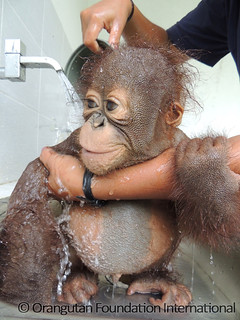 After lunch the infants are tired out and return to their sleeping enclosures for a well-earned nap. As part of their care the infants receive daily baths. Some orangutans have a fascination and love for water and often seek it out each day in the forest during their playtime. Other orangutans keep a safe distance and dislike it when peers splash water on them. This love or aversion to water is easily discernable. While some infant orphans love their baths, others are not so impressed to have water poured all over them. Luckily orangutan hair dries quickly and in no time at all they are warm and dry again.
After lunch the infants are tired out and return to their sleeping enclosures for a well-earned nap. As part of their care the infants receive daily baths. Some orangutans have a fascination and love for water and often seek it out each day in the forest during their playtime. Other orangutans keep a safe distance and dislike it when peers splash water on them. This love or aversion to water is easily discernable. While some infant orphans love their baths, others are not so impressed to have water poured all over them. Luckily orangutan hair dries quickly and in no time at all they are warm and dry again.
The trauma of losing their mothers is huge. Many of the infants do not initially trust humans. The world must seem a very big place for these tiny orangutans. It must be quite bewildering to be taken from everything they have ever known in the wild. With the dedicated love and support of the OFI caregivers, these infant orangutans learn to trust their surrogate human mother and begin to learn from her. 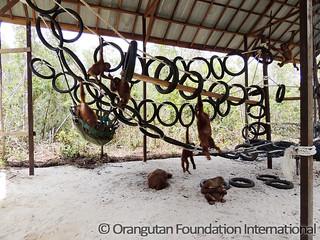 It is still many years before these infants will be strong and knowledgeable enough about the forest to be released permanently back into the wild. Yet with their dedicated caregivers by their side, these orangutans are taking the first – sometimes shaky – steps towards rehabilitation.
It is still many years before these infants will be strong and knowledgeable enough about the forest to be released permanently back into the wild. Yet with their dedicated caregivers by their side, these orangutans are taking the first – sometimes shaky – steps towards rehabilitation.


